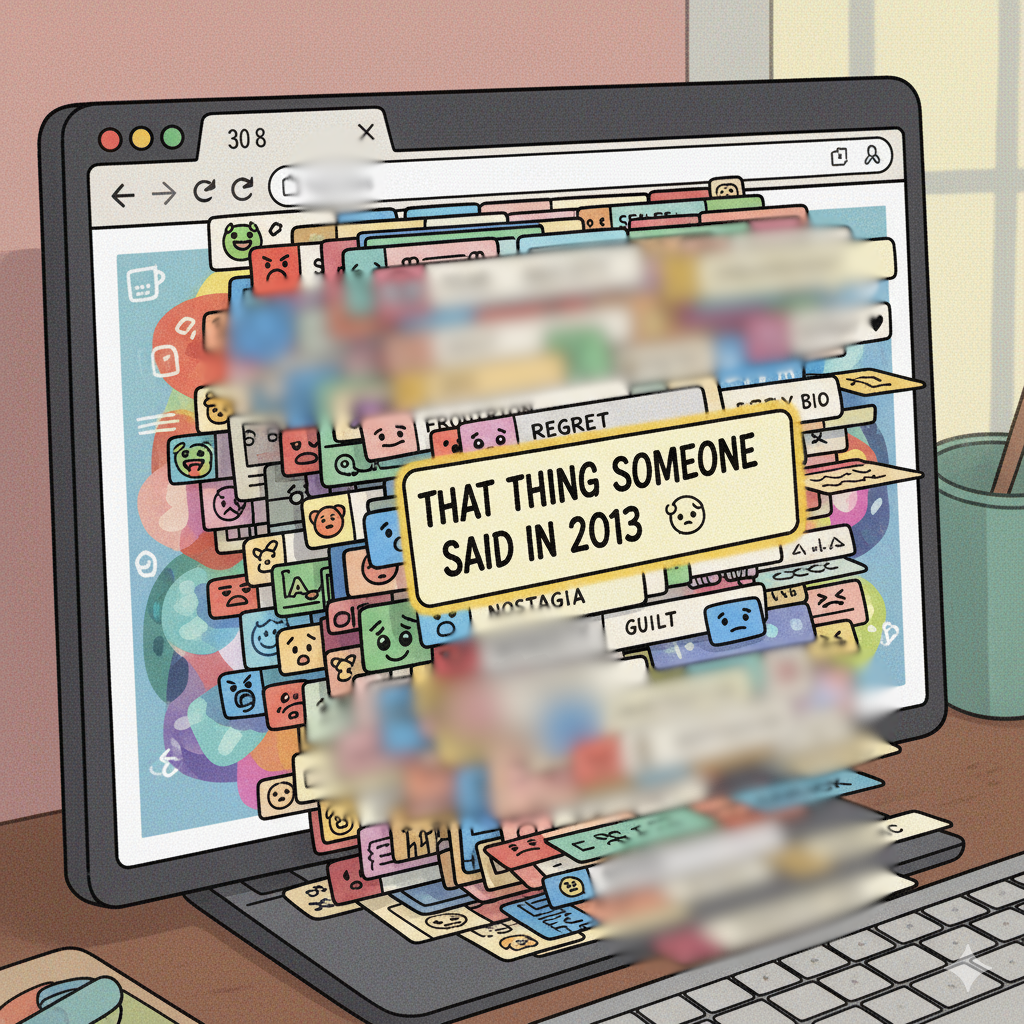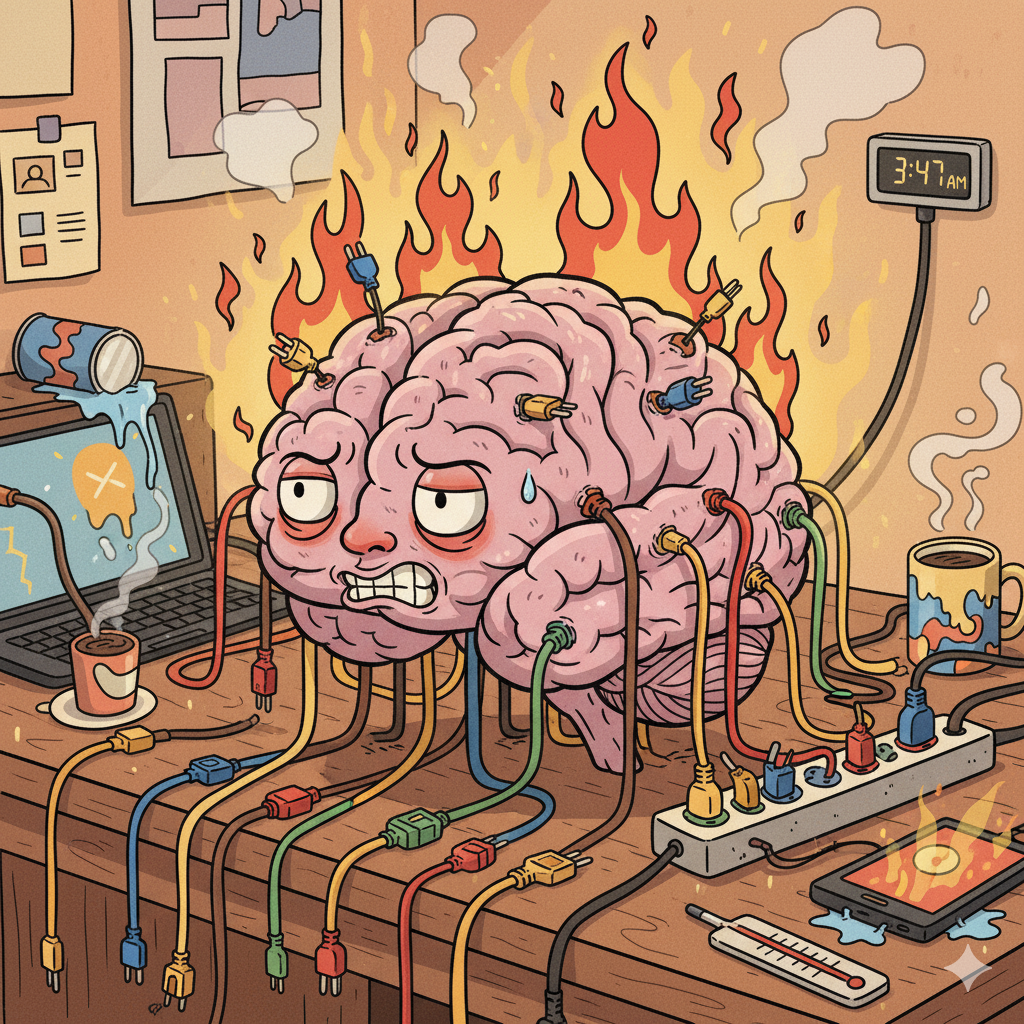Let it go, they say.
Yeah, easier said than done, I say.
When someone pokes the bear in you, there’s a moment you try to stay calm, to breathe, to remember your affirmations and resist the urge to write a strongly worded text. You tell yourself you can handle it. But if that same person keeps poking? Something snaps. You don’t roar or throw things, you just make that one passive-aggressive remark that says, “I’m fine,” but your face says, “I’m absolutely not fine.”
Then comes the spiral. The guilt. The overthinking. You start asking the usual questions: Why can’t I just let it go? Why am I taking this so personally? Why does this still feel so personal when I know better?

Here’s the thing: some of us don’t just feel emotions, we absorb them. They linger, stretch, and echo like the world’s worst song stuck on repeat. And if you happen to have ADHD or any neurodivergent wiring, that tendency to over-feel isn’t weakness – it’s literally part of your brain chemistry.
The Sponge Brain Problem
Some people are like ducks. Insults slide right off them.
Others, my people are more like sponges in puddles. Every comment, tone, or eyebrow twitch gets soaked up and stored for later analysis during a 2 a.m. shower.
For years, I thought I was just “too sensitive.” Friends said it with a laugh, teachers said it with a sigh, and family avoided sarcasm around me like it was a fire hazard. I used to feel embarrassed by how easily I’d crumble at criticism or stew over an argument long after everyone else had moved on.
It wasn’t until I began learning about ADHD and emotional regulation that I realised I wasn’t broken, I was wired differently. My brain doesn’t file emotional events neatly away. It keeps them open, like tabs in a browser that refuses to close.
When Caring Becomes Exhaustion

Now, take that emotional sensitivity, mix it with chronic overthinking and a lifetime of trying to “act normal,” and what do you get? ADHD burnout.
This isn’t your garden-variety tiredness fixed by a weekend nap and a takeaway curry. ADHD burnout is when your brain crashes headfirst into a wall made of unmet expectations, masking fatigue, and the emotional overload of caring too much all the time.
You stop being able to plan, think clearly, or even care about things you want to care about. It’s like your internal spark has been replaced by a dying candle that someone keeps trying to light in the wind.
And then someone says, “You just need to relax.”
Cue the inner scream.
Burnout doesn’t mean you’re lazy or weak. It means you’ve been running emotional marathons in a world that expects sprinting. You’ve been feeling everything at full volume while pretending you’re fine.
Why Letting Go Feels Personal

Letting go isn’t just about forgiving others, it’s about forgiving yourself for feeling things deeply.
But when you’ve spent years being told to “calm down” or “stop overreacting,” your brain begins to equate emotional release with failure.
The ADHD brain, bless it, doesn’t always regulate dopamine or norepinephrine efficiently. These neurotransmitters control motivation and mood, which means an offhand comment can feel like a dagger, while actual criticism can feel like a sledgehammer.
Add in Rejection Sensitive Dysphoria (RSD) a fancy term for the gut-punch reaction many ADHDers have to perceived rejection and you’ve got yourself a perfect storm. Your brain doesn’t just interpret rejection; it embodies it. You feel it in your chest, your stomach, your whole sense of self.
So when someone hurts you, even accidentally, your brain doesn’t whisper, “Let it go.” It screams, “You’re unsafe!”
That’s not immaturity. That’s neurology.
The Loop We Can’t Escape
Here’s what happens next in the emotional burnout cycle:
You overextend yourself trying to be liked.
You mask your real feelings.
You crash.
You feel guilty for crashing.
You overcompensate.
You crash again.
It’s the emotional version of trying to sprint on a treadmill set to “mountain goat mode.”
We can’t always control when the cycle starts, but we can recognise the signs. The earlier you spot that creeping irritation, that familiar brain fog, that internal monologue saying, “They’ve probably gone off me,” the sooner you can step off the treadmill.
How to Actually Let It Go (Even When You Can’t)
Let’s be realistic: “Letting it go” isn’t an on/off switch – it’s a gradual detangling.
Here’s what’s helped me (and what might help you too):
1. Name it before it spirals.
Say out loud, “I feel hurt,” instead of “I am hurt.” The first is temporary. The second becomes identity.
2. Pause before responding.
Impulse plus emotion is a volatile cocktail. A ten-minute pause can save a week of regret.
3. Ask for clarity.
Sometimes the “attack” isn’t one at all, it’s your brain’s radio static.
4. Detach your worth from their words.
Their bad day isn’t your moral failure.
5. Build emotional armour, not a fortress.
You can protect your peace without hardening your heart.
6. Say “no” early.
Burnout thrives on overcommitment. Boundaries aren’t rejection, they’re insurance.
7. Use humour.
A self-aware quip beats a self-destructive spiral. (“Well, that’s going straight to my highlight reel of awkward moments.”)
8. Rest before you break.
You don’t have to earn your downtime with exhaustion.
The Emotional Hangover

The truth? Sometimes we don’t want to let it go, because holding on feels safer. It gives us something to analyse, a way to make sense of the chaos. But emotional rumination is just your brain’s version of doomscrolling: addictive, exhausting, and ultimately unhelpful.
Letting go isn’t forgiving the other person; it’s forgiving yourself for feeling the sting. It’s telling your brain, “Thank you for trying to protect me – but we can rest now.”
So when the bear gets poked next time, maybe don’t fight it, and don’t shame yourself for growling. Just notice it, breathe, and walk away with your dignity and your peace intact.
You’re Not Too Sensitive, You’re Just Human
Sensitivity isn’t a flaw, it’s evidence you care deeply.
And yes, caring deeply is exhausting. But it’s also what makes you kind, intuitive, and self-aware. The world doesn’t need you to stop feeling; it needs you to stop apologising for it.
So the next time you find yourself overthinking an argument or replaying a tone of voice that hurt, remember: your empathy is not the problem. Your burnout isn’t weakness. You’re not broken – you’re just carrying too much.
And the bravest thing you can do? Put some of it down.
Question:
What’s one thing you wish you could finally let go of, but still find yourself carrying around?
*This image is AI-generated with prompts made by me and serves no educational purpose, it is only used to highlight certain aspects of this article.




